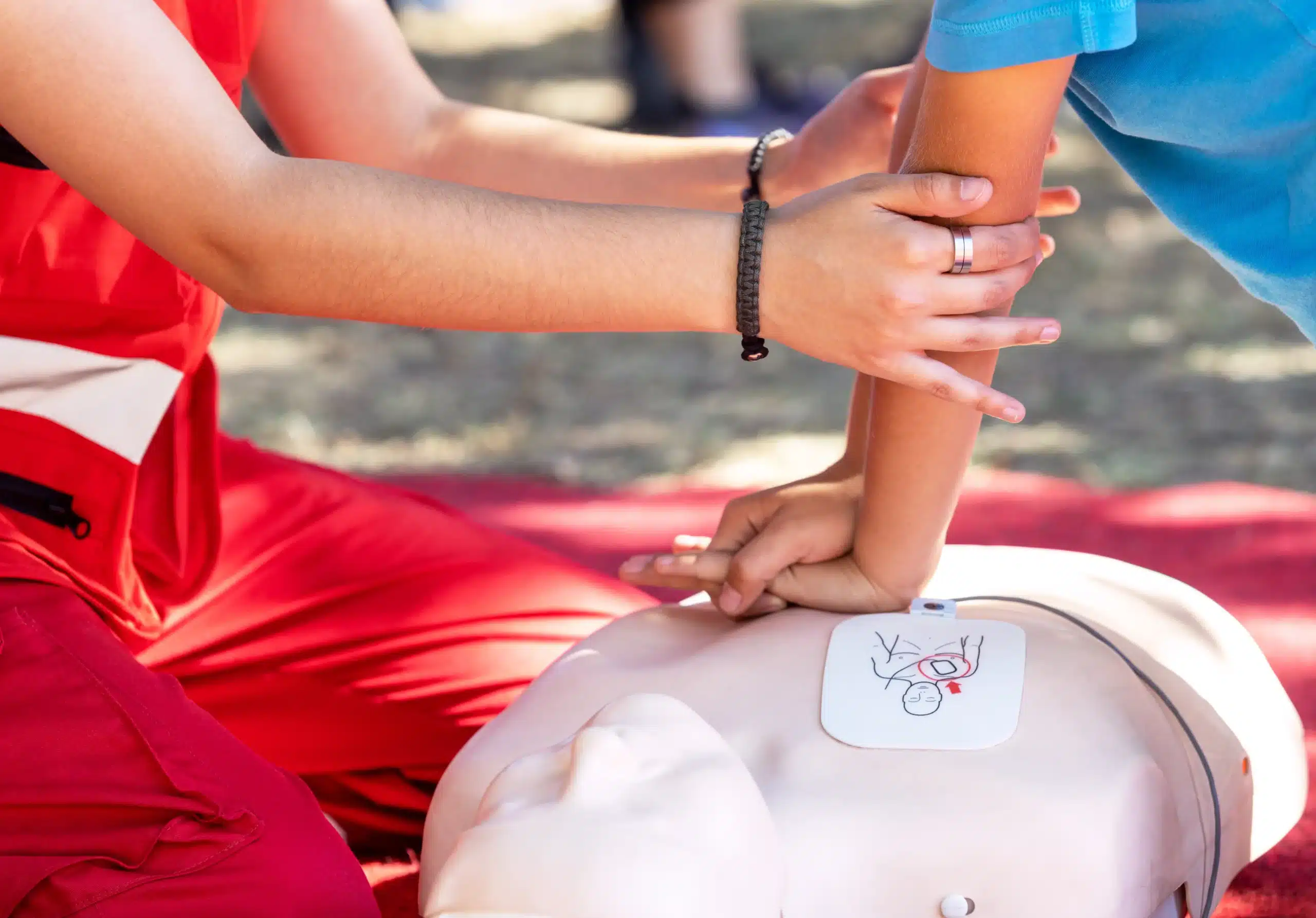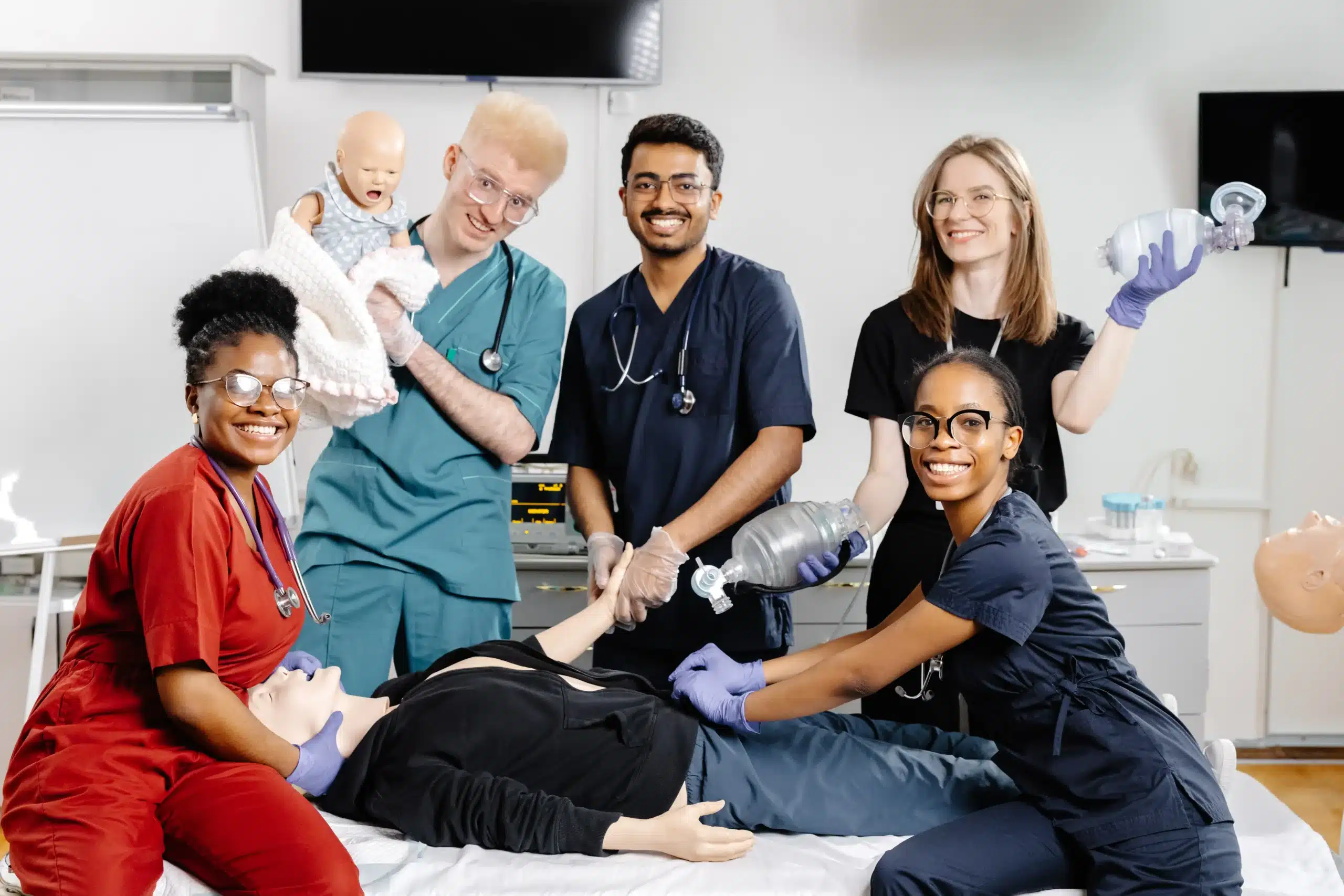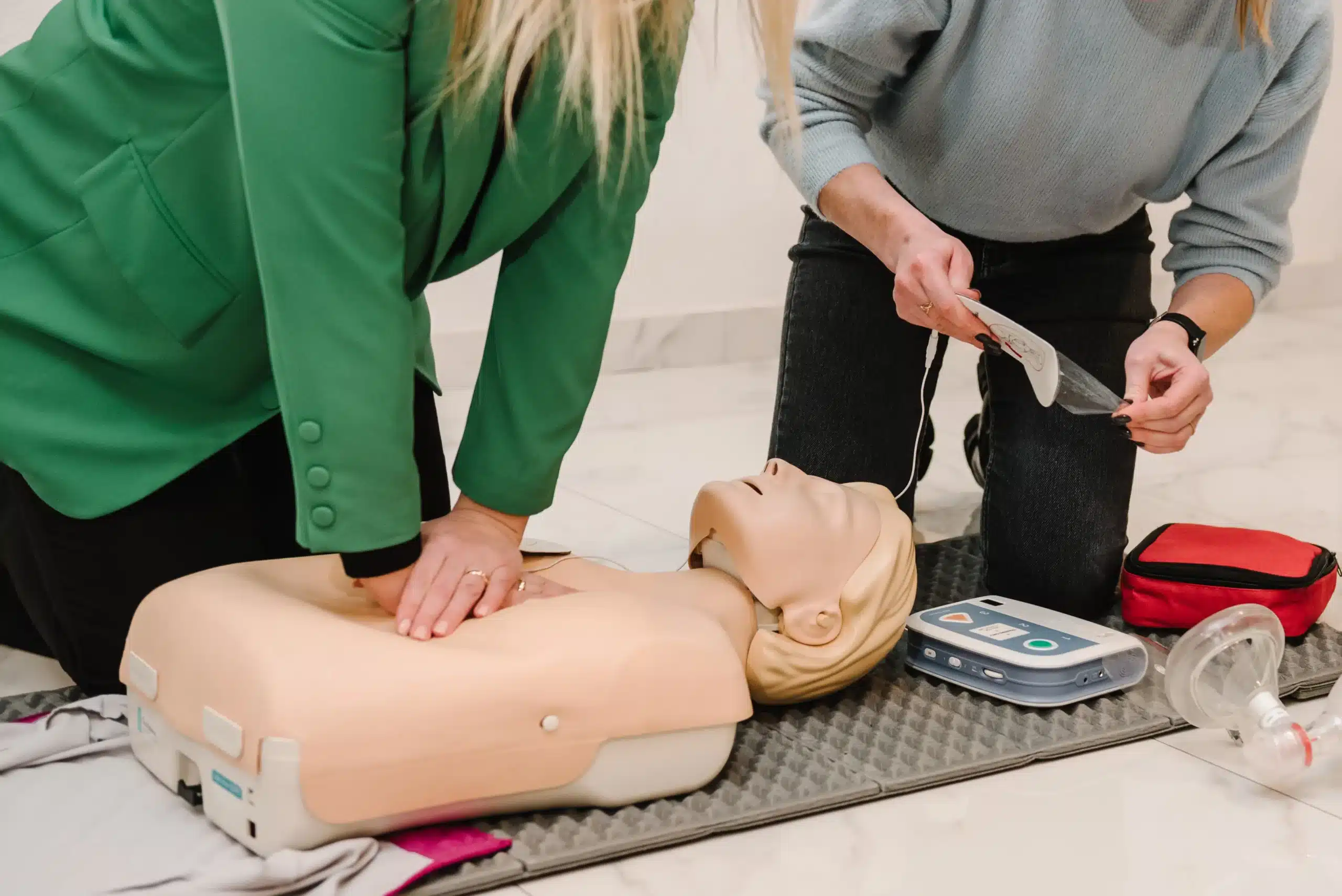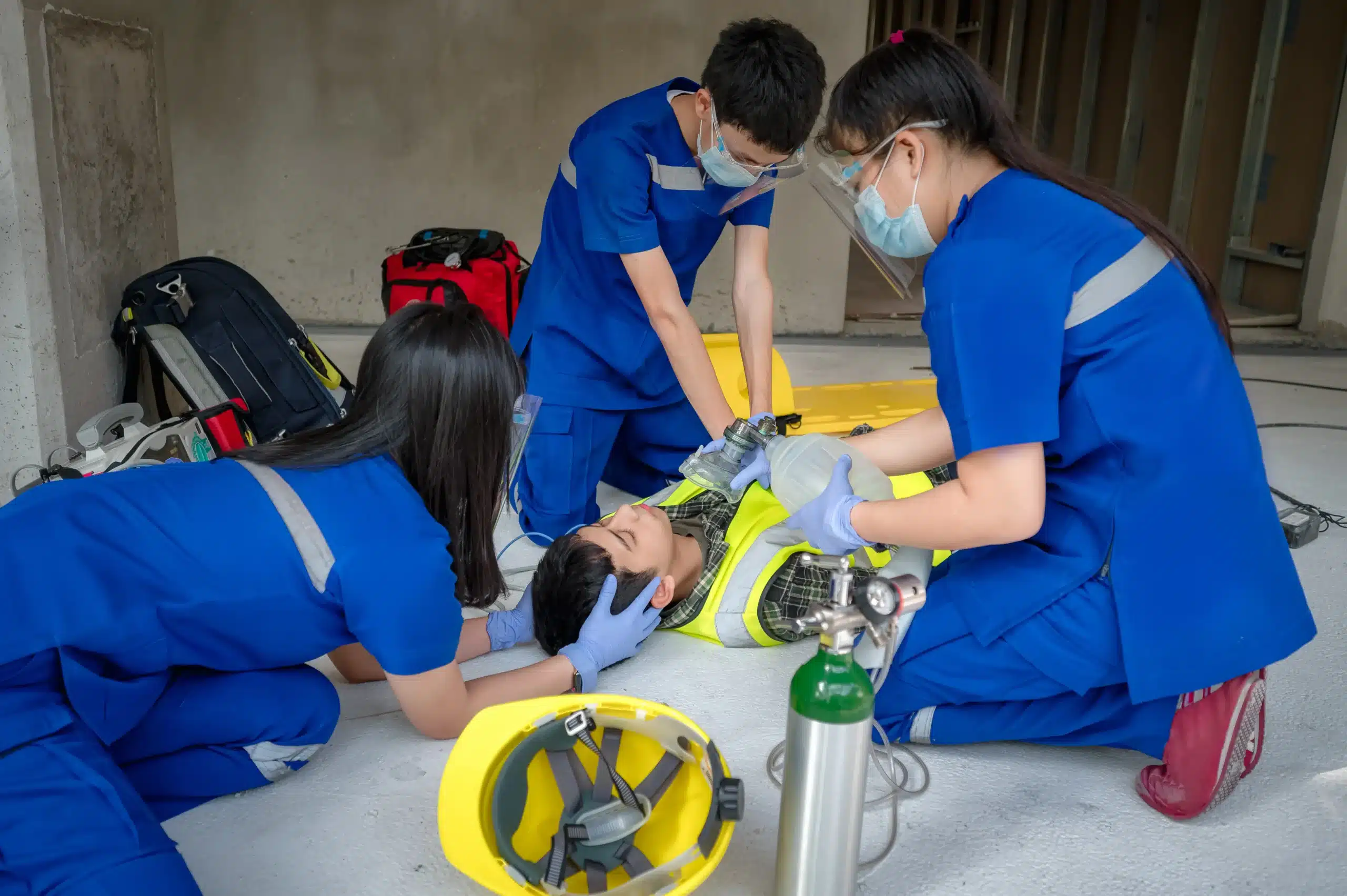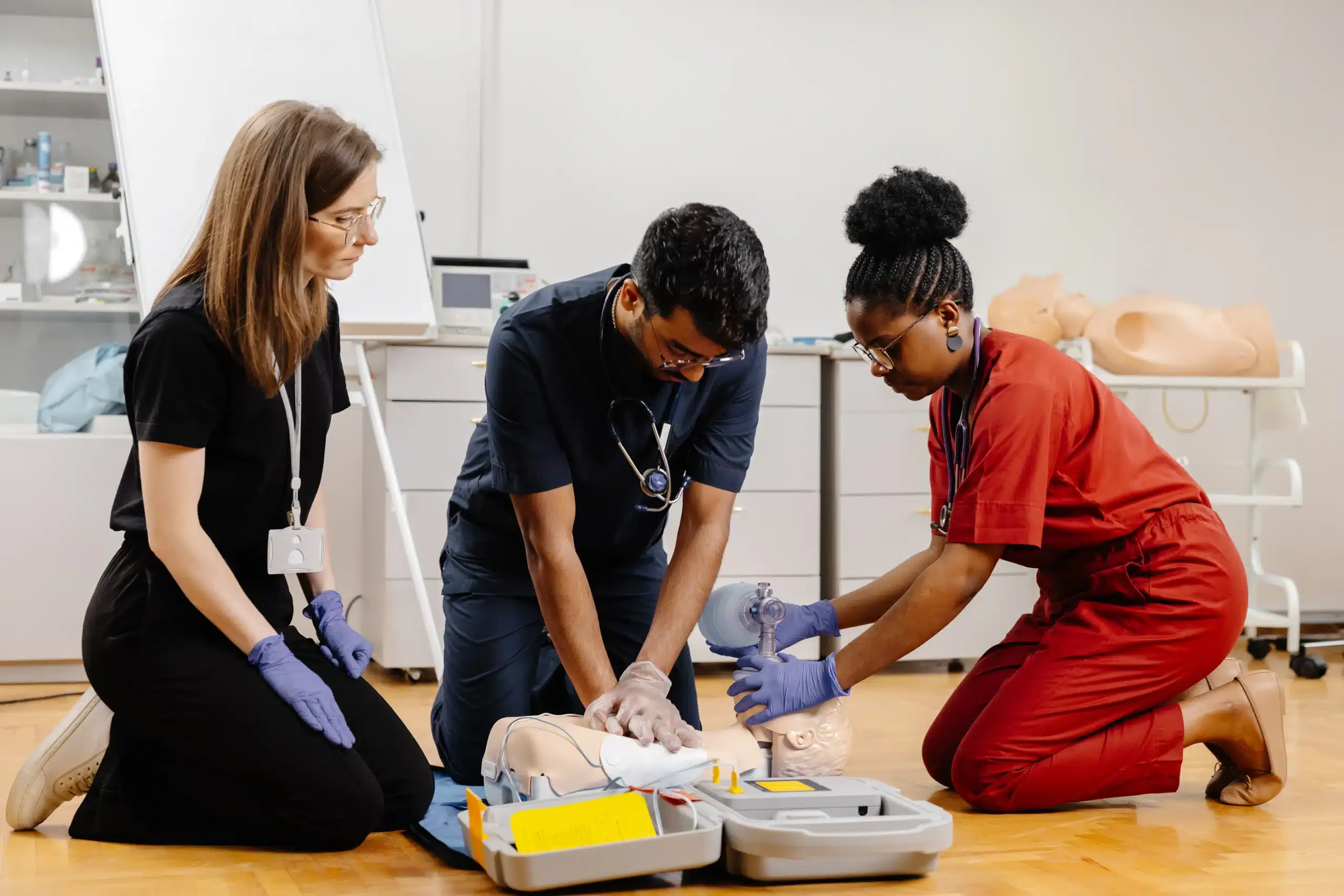Your BLS certification is more than just a credential—it’s a testament to your commitment to providing high-quality care. Keeping it current ensures you’re prepared to respond confidently in critical situations. But the recertification process can sometimes feel overwhelming. Where do you start? What are the requirements? How do you find a course that fits your schedule and budget? This guide breaks down everything you need to know about BLS recertification, including tips for finding “BLS recertification near me,” managing test anxiety, and staying up-to-date with the latest guidelines. We’ll help you navigate the process with confidence, so you can focus on what matters most: providing excellent patient care.
Key Takeaways
- Stay current with life-saving skills: Regular BLS recertification ensures you’re confident and prepared for emergencies. Explore various learning formats and find a course that suits your needs.
- Choose a reputable provider: Select an accredited provider offering comprehensive training aligned with the latest guidelines. Consider instructor qualifications, course content, and scheduling options.
- Prepare for success: Review updated materials, practice key skills, and manage test anxiety through relaxation techniques. Regular practice between renewals keeps your skills sharp.
What is BLS Recertification?
BLS recertification is a refresher course for healthcare professionals who need to renew their Basic Life Support (BLS) certification. It keeps your skills sharp and ensures you’re up-to-date on the latest guidelines for providing emergency care. Think of it as a tune-up for your life-saving abilities. If your certification is nearing its expiration date, it’s time to start thinking about BLS recertification.
Key BLS Recertification Components
BLS renewal courses cover the core skills needed to respond effectively to life-threatening emergencies. You’ll review and practice high-quality CPR for adults, children, and infants, including how to use an AED. The courses also emphasize recognizing the signs of a cardiac arrest and other emergencies, so you can act quickly and confidently. Many providers, including the American Heart Association, offer various ways to recertify, including in-person and blended learning courses.
Initial Certification vs. Recertification
The main difference between initial BLS certification and recertification lies in the assumed level of experience. Initial certification courses are designed for people with little or no prior experience. Recertification courses build upon the foundation you already have. These courses tend to be faster-paced, focusing on refining existing skills and incorporating any updates to the guidelines. Remember, your BLS certification typically expires every two years. While you can sometimes renew within a grace period after the expiration date, it’s always best to plan and recertify beforehand. Check with your certifying organization, such as the American Heart Association, for specific renewal policies.
Find BLS Recertification Courses Near You
So, you’re ready to renew your BLS certification? Great! Finding the right recertification course doesn’t have to be a headache. Whether you prefer in-person learning or the flexibility of online courses, several options are available. Let’s explore how to find BLS recertification courses near you.
Local Providers
In-person training offers hands-on learning and direct interaction with instructors. Here are a few places to start your search:
Safety Training Seminars
Safety Training Seminars offers BLS recertification courses designed to keep your skills current. Our classes cover essential BLS skills, giving you the confidence to handle emergencies. Check out our website for BLS Recertification information.
American Red Cross
The American Red Cross is another well-known provider of BLS recertification. They offer courses for healthcare providers and focus on high-quality, affordable training. See what’s available in your area on the American Red Cross website.
Local Hospitals and Community Colleges
Many local hospitals and community colleges also offer BLS renewal courses. Check with hospitals in your area or community colleges, or browse resources like the Northern CA CPR Directory to find a course that fits your schedule and budget.
Online Options
If your schedule makes in-person classes difficult, online BLS recertification courses offer a flexible alternative. Providers like ACLS Medical Training offer 100% online recertification that covers all the required material. While convenient, remember that online learning doesn’t offer the same hands-on practice as in-person training.
Locate Courses with These Tools
Finding a course that meets your needs is key. Consider factors like location, cost, and the provider’s reputation when making your decision. Use online search engines, check with professional organizations, and browse CPR training directories to find potential providers. Don’t forget to compare schedules and pricing to find the best fit.
Online vs. In-Person BLS Recertification
Deciding how to recertify your Basic Life Support (BLS) skills? Both online and in-person options have advantages, so let’s break down what’s best for you.
Pros and Cons of Online Recertification
Online BLS courses offer incredible flexibility. You can study and test from anywhere with a decent internet connection, fitting the training around your busy schedule. This is a game-changer for healthcare professionals juggling demanding work hours. However, online recertification might not fully address the practical, hands-on aspect of BLS. Plus, staying up-to-date with the latest guidelines and procedures is crucial for any learning format, so double-check that your chosen course covers the most current information from the American Heart Association.
Benefits of In-Person Recertification
In-person BLS recertification excels when it comes to hands-on learning. You’ll receive real-time feedback from instructors, practice your skills in a realistic environment, and gain confidence through interactive scenarios. The American Heart Association requires an in-person skills assessment for their BLS certification, making in-person training essential for many healthcare providers. If you learn best by doing and value direct interaction, in-person training might be the perfect fit.
Hybrid Options
Want a blend of convenience and hands-on practice? Hybrid courses offer the best of both worlds. You can complete the cognitive portion online at your own pace, then schedule a shorter in-person session to demonstrate your skills and receive your certification. Some providers even offer combined CPR/First Aid courses alongside BLS recertification, making it easy to refresh multiple certifications at once. Providers like ACLS Medical Training offer a variety of options, so you can find the right balance.
Understand BLS Recertification Costs
Getting recertified in Basic Life Support (BLS) is an investment in your skills and career. Understanding the costs involved will help you budget effectively and choose the right course for your needs.
Typical Price Ranges
BLS recertification costs vary based on several factors, including your location, the training provider, and the course format (online, in-person, or blended). Generally, recertification is less expensive than initial BLS certification. You can expect to find BLS recertification courses between $65 and $95. Some providers offer combined CPR/First Aid courses for around $85, which can be a cost-effective option if you need both certifications. Always compare prices from different providers in your area to find the best value. Safety Training Seminars offers a low price guarantee, so you can feel confident you’re getting a competitive rate. Check our website for the latest pricing on BLS recertification courses.
Group Discounts and Package Deals
If you’re recertifying with colleagues or friends, inquire about group discounts. Many training centers, including Safety Training Seminars, offer reduced rates for group bookings. This can be a great way to save money, especially for larger groups. Some providers also offer package deals that combine BLS recertification with other courses, such as ACLS or PALS. These packages can be more economical than taking each course individually. Contact us to learn more about our group discounts.
Watch Out For These Hidden Fees
While the advertised course fee is usually the primary expense, be mindful of potential hidden costs. Some providers charge extra for course materials, certification cards, or online access codes. Ask about these fees upfront to avoid surprises. Also, factor in any travel expenses you might incur for in-person courses. Staying organized and planning ahead can help you avoid unexpected costs and keep your recertification process smooth and affordable. Remember, maintaining your BLS certification is essential for many healthcare roles. Investing in your skills ensures you’re prepared to provide high-quality care and stay up-to-date with the latest guidelines.
Choose the Right BLS Recertification Provider
Picking the right BLS recertification provider is key to a smooth and valuable learning experience. Here’s what to consider:
Accreditation and Certification Standards
First, confirm your chosen provider offers courses adhering to the latest American Heart Association guidelines. Look for providers, like Safety Training Seminars, accredited by a nationally recognized organization. This ensures the course meets high quality standards and your certification will be widely accepted. Don’t hesitate to ask potential providers about their accreditation status upfront.
Course Content and Materials
A good BLS recertification course should cover essential topics like adult, child, and infant CPR, use of an AED, and relief of choking. Consider which learning style suits you best—some providers offer blended learning with online modules and in-person skills sessions. While online learning offers flexibility, in-person BLS recertification provides hands-on training and allows you to practice these skills in a controlled environment.
Instructor Qualifications
Experienced, certified instructors make all the difference. They can offer personalized guidance and answer your questions effectively. Check if the instructors are healthcare professionals with extensive real-world experience. The American Red Cross, for example, is known for its rigorous instructor training programs.
Flexibility and Scheduling Options
Your schedule is busy, so choose a provider that offers convenient scheduling options. This might include weekend or evening classes, online modules, or accelerated courses. Online BLS courses have become a popular option, offering healthcare professionals increased flexibility.
Reviews and Ratings from Past Participants
Before committing to a provider, see what other students have to say. Online reviews and testimonials can give you valuable insights into the quality of instruction, course materials, and overall learning experience. Look for comments about the instructors’ helpfulness and the course’s effectiveness.
Prepare for Your BLS Recertification
Getting ready for your BLS recertification? Here’s what you need to know to feel confident and prepared.
What to Expect During the Course
BLS renewal courses cover essential life-saving skills, including high-quality CPR, AED use, and recognizing the signs of a cardiac arrest. You’ll review these core concepts and practice your skills, ensuring you’re ready to respond effectively in an emergency. Expect hands-on practice, demonstrations, and a written exam.
Tips for Successful Recertification
One challenge with BLS renewal is keeping up with changes in guidelines and procedures. Review updated materials beforehand—don’t wait until test day. Common pitfalls include not reviewing the course material and being surprised by updates. Use online training resources or practice tests to refresh your knowledge and pinpoint areas needing extra focus. Managing test anxiety is also important. Deep breathing exercises or mindfulness techniques can help you stay calm and focused during the exam. Check if your employer offers financial help for recertification—some do! Staying current with the latest guidelines and practicing your skills are essential for success.
Maintain Your Skills Between Renewals
The American Heart Association (AHA) emphasizes regular practice for BLS providers. Between renewals, refresh your skills periodically. Even a quick review of the protocols can make a big difference. Attend short refresher courses or practice with colleagues to stay sharp. This ongoing practice helps you prepare for recertification and ensures you’re always ready to provide excellent care. The AHA points out the value of frequent training to maintain these essential skills.
Common Challenges and How to Overcome Them
Let’s face it, BLS recertification can sometimes feel like a hurdle, especially when juggling work, family, and other commitments. But with the right strategies, renewing your certification can be a smooth process. This section addresses common challenges and offers practical solutions to help you succeed.
Time Management for Healthcare Professionals
Many healthcare professionals struggle to find time for BLS recertification. Long shifts, demanding schedules, and family obligations can make it tough to fit in extra training. One increasingly popular solution is online BLS courses, which offer flexibility and convenience. You can study at your own pace, anytime, anywhere. However, it’s important to discuss recertification needs with your employer to ensure they support your efforts, whether it’s through adjusting your schedule or covering course fees. Open communication can make a big difference in effectively managing your time. Consider exploring resources and articles that offer tips for time management for healthcare workers.
Manage Test Anxiety
Test anxiety is a real concern for many people facing recertification. The pressure to perform well can be overwhelming, even for experienced professionals. Thorough preparation is key. Review the course material carefully, focusing on key concepts and procedures. Practice scenarios and quizzes can build confidence and reduce anxiety. Simple relaxation techniques, like deep breathing or mindfulness exercises, can also help calm your nerves before the exam. Remember, the goal is to refresh your skills and ensure you’re prepared to provide the best possible care. Explore online resources or apps that offer guided meditation and relaxation exercises.
Stay Updated with Changing Guidelines
BLS guidelines evolve periodically to reflect the latest research and best practices. Staying current with these updates is crucial for effective recertification. Before your exam, review the most recent guidelines and course materials. Don’t rely solely on your previous knowledge, as even small changes can impact your performance. Many providers offer updated resources and practice tests to help you familiarize yourself with any revisions. Staying informed ensures you’re providing care according to the latest standards. Check out resources like Science Times for insights into common pitfalls and how to avoid them. The American Heart Association website is another excellent resource for staying up-to-date on the latest BLS guidelines.
Balance Work and Recertification Requirements
Balancing work and recertification can feel like a juggling act, but it’s essential for maintaining your credentials and providing quality care. Talk to your supervisor about integrating recertification into your work schedule. Some employers offer on-site training or allocate dedicated time for professional development. Explore options like blended learning, which combines online modules with in-person skills sessions, to fit your busy schedule. Research from ScienceDirect highlights the importance of employer support in facilitating mandatory training and achieving positive health outcomes. By working together, you can find a balance that supports both your career and patient care. Consider joining online forums or communities for healthcare professionals to share tips and strategies for balancing work and professional development.
Related Articles
- BLS Renewal in Brentwood: Your Complete Guide – Brentwood CPR Classes
- BLS Renewal Near Me: A Practical Guide – Brentwood CPR Classes
- BLS Certification in Antioch: A Complete Guide
- Find BLS Classes Near Me: Your Certification Guide – Brentwood CPR Classes
- BLS Certification in Brentwood: Your Complete Guide – Brentwood CPR Classes
Frequently Asked Questions
How often do I need to recertify my BLS certification?
Typically, BLS certification is valid for two years. It’s always a good idea to check with your certifying organization or employer for their specific requirements, as they might vary slightly. Don’t wait until the last minute – plan and schedule your recertification in advance to avoid any lapses in your credentials.
What’s the difference between online and in-person BLS recertification?
Online recertification offers flexibility, allowing you to complete the coursework at your own pace and from anywhere with an internet connection. In-person classes provide hands-on training, direct interaction with instructors, and the opportunity to practice skills in a real-world setting. Consider your learning style and schedule when deciding which format is best for you. Some providers offer hybrid courses that combine online learning with in-person skills sessions.
How much does BLS recertification cost?
The cost of BLS recertification varies depending on the training provider, location, and course format. Generally, it’s less expensive than initial certification. Expect to pay somewhere between $65 and $95. Look for providers who offer group discounts or package deals if you’re recertifying with colleagues or need multiple certifications. Always ask about any potential hidden fees, such as materials or certification card costs, before registering for a course.
What if I let my BLS certification expire?
While some certifying organizations offer a grace period, it’s best to recertify before your expiration date. If your certification does expire, you might need to retake the entire BLS course rather than just a refresher. Check with your certifying organization for their specific policies on expired certifications. Staying current with your BLS certification ensures you’re always prepared to respond to emergencies.
How can I fit BLS recertification into my busy schedule?
Balancing work, family, and other commitments can make finding time for recertification challenging. Explore online BLS courses, which offer flexibility and allow you to study at your own pace. Talk to your employer about scheduling options or consider hybrid courses that combine online learning with shorter in-person skills sessions. Planning and open communication can help you integrate recertification into your busy life.


